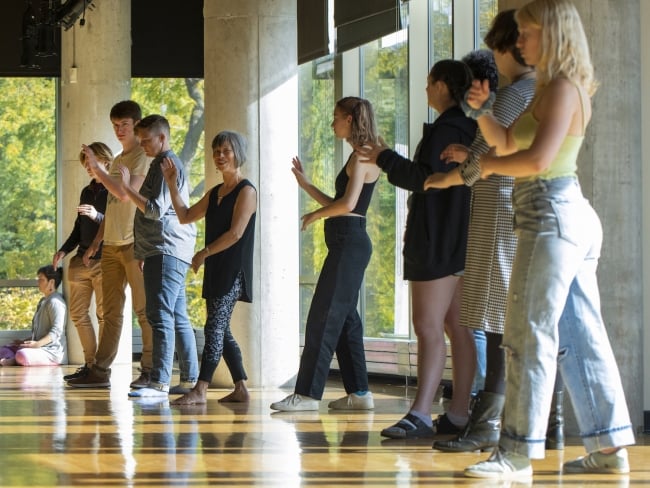You have /5 articles left.
Sign up for a free account or log in.

Lawrence University’s phone-free Doing Nothing class takes students through a range of unplugged relaxation techniques, including tai chi.
Lawrence University
Abigail O’Brien had never heard of Wyoming Catholic College at the start of her college search, but she applied immediately after learning of an unusual policy: no phones.
“I was struck that somewhere in our country there was a group excited and willing to give up their phones,” said O’Brien, who graduated from Wyoming Catholic in May. She said the idea of such a place was “almost impossible to picture.”
“We experience phones as an extension of ourselves and, without it, it’s really freeing,” she said, adding that many of her friends tell her wistfully it would be nice to go phone-free. “I have friends who I think would understand, but it’s one of those things you can’t fully understand without doing it.”
Among 18- to 29-year-old Americans, cellphone ownership is 100 percent, with 96 percent owning smartphones, according to 2021 survey data from Pew Research. In that same age group, 48 percent report using the internet “almost constantly.”
As mobile phones become ubiquitous and higher ed headlines hammer a seemingly endless stream of AI developments, students like O’Brien, here and there, in a quiet backlash against digital saturation, are finding themselves drawn to classes, or even institutions, focused on unplugging. These efforts may be less about beating phone addiction and more about embracing a more mindful lifestyle. For members of a generation who have never known a world without smartphones, it is a big change.
Now I can’t google things—if I get home and don’t remember what I wanted to look up, it probably didn’t matter.
—Abigail O’Brien
In the Doing Nothing course at Wisconsin’s Lawrence University, students were initially told to keep their phones away during class, but they “couldn’t resist looking at their phones,” said Constance Kassor, an associate professor of religious studies. “They were peeking at their phones or staring at them before class started.”
Stepping up the unplugging, students now place their cellphones in a room across the hall during the one-credit, once-a-week course that covers things like sleep schedules, tai chi and visits to a greenhouse.
“Having them be physically separated from their phones has made a huge difference,” Kassor said. A handful of students “have commented they didn’t know how hard it would be.”
It can be harder. Wyoming Catholic, which incorporated in 2005 and welcomed students on campus in 2007, has a three-part technology policy: 1. No televisions on campus; 2. Dorm internet access is limited to college email and selected websites for class (public spaces have full internet access); 3. No cellphones or handheld devices with wireless or cellular data.
Before starting at the college, students go cold turkey without their devices as they embark on a three-week, mandatory freshman wilderness trip. Then, when arriving on campus, students leave their phones in a student life center and check them out when traveling out of town.
“There was a general thought [at the college’s inception] about the connectivity,” said Kyle Washut, acting academic dean at Wyoming Catholic.
“Our coffee shop is on Main Street, and people will walk in and say, ‘There’s something different,’” he said. “It takes a moment to realize the difference is half the room isn’t on their phone.”
However, Wyoming Catholic is not against technology. The college “sees the vast good that technology can bring, especially to those with habits of silence,” according to its technology policy. The college has public computers and encourages students with laptops to bring them for writing papers.
Some programs go beyond phone bans to explore simpler lifestyles amid an increasingly high-tech, fast-paced world.
Professor Justin McDaniel designed the class Living Deliberately: Monks, Saints, and the Contemplative Life to teach students why followers of many religions, such as Catholicism and Buddhism, give up worldly things. McDaniel designed the course in 2002 at Ohio University and has taught it at the University of Pennsylvania since 2009.
In the beginning, McDaniel said, he would tell students what philosophers and psychologists would say, giving the social, economic and power reasons.
“And it was fine, but the students weren’t buying it, and to be honest with you, I wasn’t, either,” he said. “So I said, ‘Why don’t we try to do some sort of monastic practice?’”
For one semester, class participants vow to give up their phones, along with wearing makeup, eating after dark and using gestures, such as waving to a friend. For one month during the course, they cannot speak and can only write requests.
“I didn’t want it to be another thing students took on, like taking a yoga class or some insignificant practice that will do nothing,” McDaniel said. “Monastic systems are only effective because they change everything about your lifestyle.”
The class culminates with traveling across the world—usually to Thailand—to visit monasteries. Last semester, roughly 320 students applied for the 14 spots, he said.
Other universities, including Michigan-based Hillsdale College and High Point University in North Carolina, have also added monastery trips to their offerings.
While some students may be seeking a phone-free escape, the professors largely attribute interest in these programs to students allowing themselves a reprieve from productivity.
“So many students are focused on adding one more thing to their résumé,” Kassor said, adding that the class is a low-stakes way of ensuring students show up to receive a credit while learning important skills. She said that attending class “is something they have to do, but they’re actually learning these destress skills.”
“Some have said it’s the only hour of their week they didn’t have to be productive,” she said.
For participants, these programs can leave a lasting impression. When graduating from Wyoming Catholic, O’Brien did buy a new phone, but she chose one without internet and apps.
“Now I can’t google things—if I get home and don’t remember what I wanted to look up, it probably didn’t matter,” she said. “The wealth of information we have distracts us more than helps us.”





